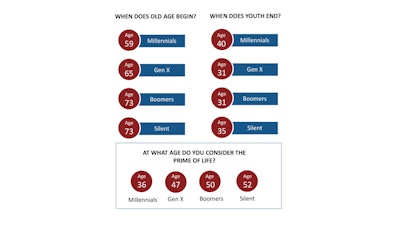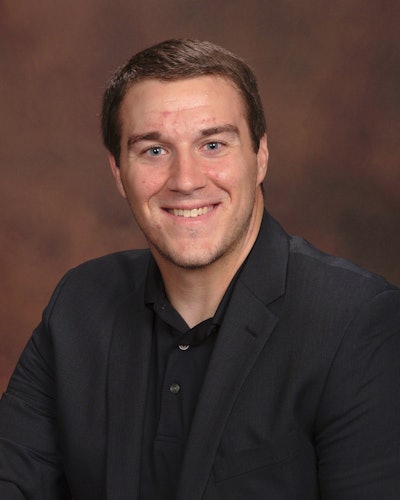
Every day that I browse Facebook, it seems someone has always posted some new article about how Millennials are changing a certain industry with their shopping habits, or explaining the differences in lifestyle choices between previous generations.
As a Millennial in his 30s myself, I’m always intrigued. We Millennials tend to get a bad rap from our elders, so I’m always on the lookout for fodder I can use for whenever I get into a generational debate. Much discussion in the area distribution/supply chain hiring focusing on generational differences also seems to focus on generational differences between employees or potential hires.
I recently came across a June article by Time’s Money publication, “This Is The Age When You Become ‘Old,’ According To Four Different Generations,” which discusses the findings of a new study by U.S. Trust. According to firm’s “Insights on Wealth & Worth report,” here’s the age that different generations say old age begins at: Millennials — 59; Gen X — 65; Boomers — 73; Silent — 73. Apparently, my fellow young people think the “old” threshold is much younger than past generations. By Millennial standards, I’m already past halfway to being old (and my body would agree).
On the other end of the spectrum, here’s when those generations said youth ends: Millennials — 40; Gen X — 31; Boomers — 31; Silent — 35. This shows that Millennials think youth lasts considerably longer than previous generations. By Millennial standards, I still have a decent amount of my youth left — hurray!
The study also asked respondents what age they consider the prime of life to be, with the results as: Millennials — 36; Gen X — 47; Boomers — 50; Silent — 52. Out of these three questions, this “prime” one shows the biggest discrepancy between Millennials and the three prior generations. By these results, my life will peak soon, and then it’s all downhill.

 Mike Hockett, Editor, Industrial Distribution
Mike Hockett, Editor, Industrial DistributionObviously, every Millennial doesn’t think this way, as these results are the aggregate of a total respondent pool. But it’s undeniable that today’s young people — as a whole — think quite differently about life than even one generation prior. Compared to their elders, Millennials seem to think old age begins much earlier, but at the same time, think youth lasts longer. Thus, they think the gap between youth and old age is quite small — 19 years.
A number of factors could be contributing to this — parenting, technology, social media or just society in general.
I know it’s cliché, but personally, I’m one of those people who believe age is just a state of mind. I know fellow Millennials who have the personality of someone in their 50s, and people in their 40s who blend in seamlessly with much younger people. Health is another factor. Great health can keep someone looking and feeling young much longer than those in mediocre health.
In terms of the general workforce, the talk of “here come the Millennials” has come and gone. As of 2015, Millennials comprise the largest share of the American workforce, and that share will only continue to grow over the years. Yes, we have our cultural, political, technological and mind-set differences than the Boomers before us. And sure, I’m biased, but I truly believe Millennials are no worse or better than previous generations.
So, I ask you, how old do you feel?
Have any thoughts on the differences you see in today's Millennial employees vs. those of previous generations? Feel free to share them in the comments below.






















